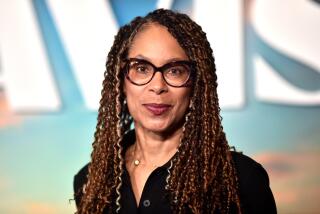Focus : The Real Discovery : AFTER 10 YEARS, CABLE CHANNEL HAS SOME NUMBERS IT LIKES AND AN AUDIENCE THAT LIKES WHAT IT SEES
- Share via
From great white sharks to great military landings to great scandals of our times, Discovery Channel has covered a wide range of topics in the past 10 years. The award-winning cable channel specializing in nonfiction entertainment marks a decade of programming by throwing itself a big party Sunday with two hours of highlights.
“Great Moments of Discovery,” hosted by Bob Costas, features clips from some of the network’s acclaimed specials: ‘Ivory Wars,” “In the Company of Whales,” “People of the Forest,” “Watergate,” “Normandy: The Great Crusade,” “Shark Week” and “A Time of AIDS.” Discovery Channel fans Kelsey Grammer, John Tesh, Mary Hart and Sherry Stringfield are on hand to give testimonials of their affection for the channel.
“I’m extremely proud of that little ‘Moments of Discovery’ show,” enthuses Greg Moyer, president and chief executive officer of Discovery Networks and Worldwide Programming. “I think we’ve done some pretty neat things, if I do say so myself.”
The Discovery Channel, founded by CEO and chairman John Hendricks, began with approximately 156,000 subscribers. Today it is seen in 63.8 million homes in the United States, ranking it as the fifth largest cable network. Discovery also is beamed internationally to more than 65 nations around the globe. In 1991, it acquired The Learning Channel, now seen in 38 million homes. Discovery has won 13 news and documentary Emmy awards, 13 CableAce Awards and five George Foster Peabody Awards.
“We started with 12 hours a day from 3 in the afternoon Eastern time to 3 a.m.,” recalls Moyer, who began working at Discovery six weeks after its launch. “I remember the first year’s programming budget was $1.5 to $2 million. We used to walk around and say, ‘This is amazing. For less than the cost of two episodes of ‘Miami Vice,’ we are programming 12 hours a day, 365 days a year.’ It also tells you where our programming was coming from. It was all acquired. We couldn’t afford to make any of it ourselves. Thankfully, the world was making a lot of more documentary TV than [the amount made] in America.”
In the 1988-89 season, the network commissioned its first original program, “Ivory Wars,” which examined the dangers and controversy of protecting the African elephant.
“I love this statistic,” Moyer says. “We’re now up to 1,600 hours of originally commissioned or co-produced programming which will be delivered to the Discovery or Learning Channel in the 1995-96 season. That pretty much tells you the story of what we have been doing with the last five years of our lives.”
Hendricks, Moyer says, originally declared Discovery would focus on nature, history, science and technology and “what we call human adventure and people, places and culture. The problem was when we went out to acquire programming, there were a whole lot more nature programs than science programs. A lot of people, places and culture programs were dry as dust.”
Over the past five years, “we had a conscious strategy promoting the diversity in our schedule,” Moyer says. This fall, “we want to make sure that people know that we are going to air the most nature programming of any network in cable and the most science programming. So we are stripping nature programs at 8 and have the science genre at 9. So that every night of the week, you will have nature, science and history at 8, 9 and 10 p.m. We will try to keep it simple and make sure that everyone of those hours are of the highest possible quality.”
Back in 1988, Moyer says, the network was looking for a way to “get a spike on our ratings. We tried to use scheduling stunts to create a little bit of sizzle. We thought up ‘Shark Week’ and we scheduled it opposite the Democratic convention, so there would be a little counter-programming. At that time the meter hit the roof for us [in ratings] and ever since it’s been a summer staple.”
According to Moyer, the channel’s core viewers are between the ages of 25 and 54. “We skew more male in prime-time than female. I think we have had a tougher time getting a younger audience, an under-25 audience. We can get parents and kids watching, but once they discover MTV and before they get married. ... We have tried to make the air more contemporary. I think one of the pulls for that age group has been many of the science magazines we are airing. I think [a younger audience] is interested in the history shows.”
Surprisingly, “Shark Week,” which airs in August, has found a devoted female following. “More women than men watch ‘Shark Week.’ I will refuse to explain that. It’s the most female skewing program that we do in prime-time all year long.”
Discovery also is branching out into the feature film business. Discovery’s initial feature documentary, “The Leopard Son,” is scheduled to open in theaters next March. “We have also committed to making one IMAX film a year,” Moyer adds.
“People really appreciate what we are trying to do,” Moyer says. “We don’t have the largest viewership in the country, but we have one of the most appreciative.”
“Great Moments of Discovery” airs Sunday at 9 p.m. on the Discovery Channel.
More to Read
The complete guide to home viewing
Get Screen Gab for everything about the TV shows and streaming movies everyone’s talking about.
You may occasionally receive promotional content from the Los Angeles Times.







